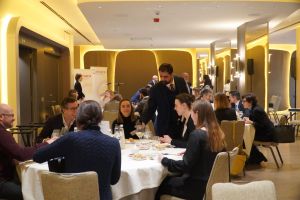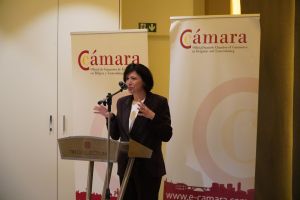Luncheon-debate held with Ana Gallego, Director General for Justice and Consumers of the European Commission
Last Tuesday 28th February, the Official Spanish Chamber of Commerce in Belgium held a new luncheon-debate in the framework of its “Business Circle” tribune, in which the Director General for Justice and Consumers, Ana Gallego, spoke about “Priorities of DG JUST for 2023: Justice, Consumer Rights and Gender Equality”.

After the welcome cocktail, the President of the Chamber, Pablo López-Álvarez, introduced the speaker reviewing her excellent curriculum and highlighting her incorporation to the European Commission directly as Director General, a sign of her wide experience.
Gallego then took the floor and began her speech by emphasizing the opportunity for Spain to hold the last full presidency before the start of the next election campaign for the European Parliament in May 2024.
“2022 was an intense year in which DG JUST took forward numerous legislative proposals”, the Director General reviewed, mentioning directives such as the sustainability due diligence directive, the insolvency directive or the digitalisation of justice directive.
Rule of law
Among the main priorities of the Directorate, Gallego underlined the extensive evaluation on the rule of law in the EU Member States that is currently underway: “We are doing intense coordination work because we cannot afford to have weak democracies in the European Union“.

The speaker also spoke about the two events that have disrupted the Commission’s agenda in the last mandate: the COVID crisis and the war in Ukraine. Regarding the latter, Gallego explained that DG JUST is coordinating international efforts to hold Russia accountable for crimes committed in Ukraine.
At the end of the presentation, there was a Q&A in which issues such as the possibility of interconnecting the property registers of the different Member States or data protection in commercial matters were raised.
From the Chamber, we would like to express our special thanks to all the participants for having contributed to the success of this luncheon-debate.
ABOUT US
The Official Spanish Chamber of Commerce in Belgium and Luxembourg is a non-profit association whose main objective is the development of trade and investments between Spain, Belgium and Luxembourg. The Chamber offers to the companies a wide range of commercial and promotional services as well as professional contacts and facilitates business networking among its partners.
CONTACT
Belgium
Avenue des Arts 1-2,
1210, Brussels, Belgium
Tel. +32 2 517 17 40
info@e-camara.com
Luxembourg
Tel. +352 661 404 399
luxemburgo@e-camara.com



